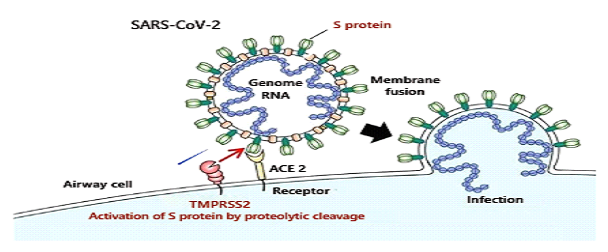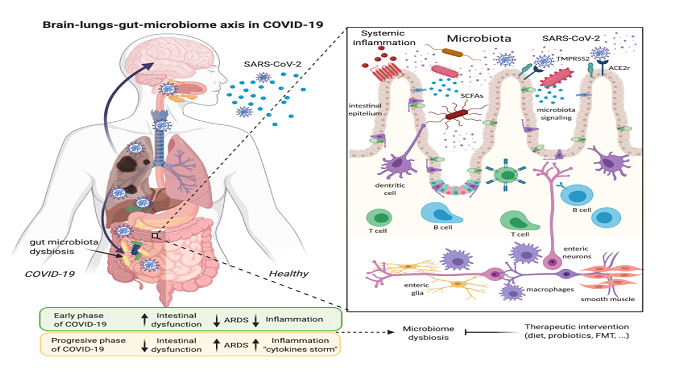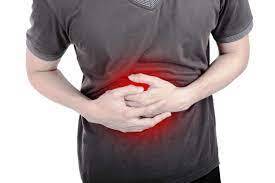- August 7, 2021
- By: MIGAdmin
- No Comments
Post Covid Gastrointestinal Problems
- Does corona virus cause Gastrointestinal problems?
Apart from taking a toll on our respiratory system, the novel coronavirus has also disrupted our digestive health. Many COVID-19 patients, especially the ones who are in their recovering phase, are reporting instances of gastrointestinal complications. As is known, post COVID has become a predominant issue experienced by many who have either tested negative or have recovered from the disease, it is important to continue monitoring the lingering symptoms so as to ensure complete recovery.
Once the SARs-COV-2 virus enters the body, it destroys all the healthy cells, including the ones present in our digestive system. Data suggests, 53% of patients with COVID-19 go on to develop at least one gastrointestinal symptom during the course of their illness. There’s also increasing evidence which does suggest that gastrointestinal symptoms may point at a higher likelihood of COVID-19 severity and related complications. Additionally, gastrointestinal complications are prevalent in patients who have either recovered or are recovering from the disease.
- How does COVID-19 Causes Gastrointestinal problems?

- What are the symptoms of Gastrointestinal disorders ?
While fatigue, loss of sense of smell and taste, and cough remain to be some of the lingering symptoms of COVID, if you have these digestive issues post COVID, seek your doctor’s help in treating them.
– Nausea and diarrhoea
– Loss of appetite
– Abdominal cramps
– Acid reflux
– Gastrointestinal inflammation and bleeding
- What are the reasons for these symptoms?
As for the lingering gastrointestinal symptoms, not only is the likelihood of lasting symptoms higher with the type of infection you had, but also a common COVID complication, hypoxia.
Hypoxia refers to a condition when the body’s saturation levels dip below normal and limit the flow of oxygenated blood to vital organs. The profound effect of hypoxia is felt on the respiratory organs, causing symptoms like shortness of breath, chest pain and difficulty breathing. However, as many experts have suggested, hypoxia could also impact the gastrointestinal tract, and cause symptoms such as uneasiness, acid reflux and digestive ailments

Primary inflammatory stimuli trigger the release of microbial products and cytokines, which can cause microbial dysbiosis that can induce an inflammatory environment, releasing intestinal cytokines into the circulatory system, increasing the systemic inflammation of COVID-19 (Intestinal dysbiosis).
Gastrointestinal and digestive symptoms could also be caused by prolonged use of some of the medications used for COVID-19 treatment like steroids and other drugs. Certain medications given during COVID-19 can also have a side-effect on kidney health and show up in the form of gastrointestinal symptoms.
- How to manage gastrointestinal problems during or after COVID recovery?
While gastrointestinal problems may go from mild to severe complications, it is important to follow a proper diet and refrain from anything that will add to your problems.
Therefore, here are a few tips to ease your digestive issues during your post COVID recovery.
– Eat a well-cooked, balanced diet, including foods that will help your body heal, recover and build back stamina. Staying hydrated is also another important factor you cannot miss.
– Add prebiotics and probiotics to your diet. Probiotics are good bacteria that improve gut health.
– People can also resort to supplementation and ORS salts, which help bring back the balance in the digestive system and sustain functions.
– Refrain from consuming processed and oily foods. Instead focus on eating timely meals consisting of some form of carbs, proteins, fibre and other vital minerals.
Supplementation of Vitamin C,D, B12 and calcium-fortified foods is a must to take care of digestive issues
Prevention of getting infected or spreading infection is of utmost important. Most important precautions to be taken are “Social vaccination”
⦁ Avoid going to crowded places
⦁ Maintain social distance from others
⦁ Frequent use of Hand sanitizers, Face masks
⦁ Vaccination
⦁ Healthy life style
⦁ Consulting a doctor when necessary
Due to inflammation, some liver enzymes can also increase due to swelling of the liver cells, when the insulin production is low. This can also cause problems related to digestion, appetite loss and other related complications.
- When to call a gastroenterologist ?
⦁ If your stomach troubles are due to a GI bug or food poisoning, you usually should feel better within 48 hours.
⦁ It could be a more serious bacterial infection or an early sign of COVID-19
⦁ Might be severely dehydrated-Signs include dark urine, extreme weakness, a dry mouth and tongue, and dizziness.
⦁ If you have diarrhea that is bloody or black, or severe belly pain
⦁ If you are feeling feverish, coughing, or feel short of breath
If the symptoms continue to bother you or become a chronic issue, consult a doctor. In some cases, blood tests might also be ordered to negate the risk of further complications.
For further information or any queries/ to book an appointment
Contact us
- 0866-2436646, 7995565092
- migcaresforu@gmail.com
- mighospital.com
- 29-8-44, Chiluku Durgaiah street, Suryaraopet, Vijayawada-02

